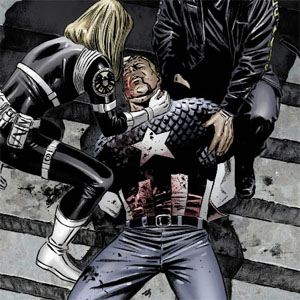I rarely buy console games anymore. I play them, but I spend so much more time on the PC that it hardly seems worth it to go out and get a new copy of the hot new release for the Xbox360 or Wii (still don't own a PS3.) I do, however, have an active Gamefly Account, and I make use of that to get to play new-ish games, one at a time. I was exceptionally lucky this month, as Batman: Arkham City popped up in my queue on release day, and landed two days after it was available for sale in stores. I loved Arkham Asylum, with the deliberate and dramatic staging of boss encounters, lore detail specific even on obscure points enough to satisfy a comic book geek and the feeling when playing well that you ARE Batman. Terrifying helpless goons dropping down from rafters, using a wide variety of gadgets from the utility belt, and satisfying melee combat made the first game almost perfect. I can say that the sequel improves on the original in all the right spots.
The game opens with a press conference concerning the new prison facility within downtown Gotham, a section of the city walled off and left to the criminals, heavily patrolled by guards ensuring that nothing escapes. The populations of both Arkham Asylum and Blackgate Prison are dumped within and left mostly to their own devices. This is, of course, a terrible idea, and it is no surprise that it is the brainchild of Batman villain Doctor Hugo Strange. Enter Batman, investigating what is really going on inside the walls of the prison, what has happened since the last game, and taking some extremely surprising turns along the way. The city environment is open, allowing for rooftop travel across long distances, gliding and using grappling tools to soar through the air.
Fans of the first game will note that nearly every major Batman villain who didn't take a major role in Arkham Asylum is present in this game. The big players, like The Penguin, Mr. Freeze and R'as al Ghul are brilliantly staged boss fights, whereas more minor villains such as Calendar Man or the Mad Hatter are featured in sidequests. The only characters returning in plot-centric roles who were also heavily featured in the first game are, of course, The Joker and Harley Quinn, and The Riddler remains ever-present at the source of secret collectibles/unlockables. Every single villain plays to their personal strengths, and they aren't abnormally good at something they shouldn't be just in order to craft a challenging boss battle. For example, The Penguin is extremely heavily armed with weapons and stolen/smuggled technology, but his melee combat ability it laughable. Despite the fact that the little fat man drops after only a few punches, he is an extremely formidable villain based on his henchmen, equipment and planning.
Story-wise, it feels like there are really two plots going on at the same time which cross paths from time to time. Dealing with the Joker and the aftermath of his having injected himself with the TITAN serum at the climax of the first game is an ever-present goal while trying to find out exactly what Strange is doing in the new prison facility, and how he ever managed to make this monstrosity happen. Actually believing that Gotham would let the Arkham City project fly in the first place is the hardest bit of the plot to swallow, and you're hit with it off the bat (no pun intended.) If I had a singular complaint about the film, it would be that the main plot is pretty short. It was an engrossing story, but I'd beaten the game after two evenings and a solid long session on one weekend day. I've gone back to work on sidequests, but as I'm not huge on hunting down optional content, I'm effectively done after only I'd guess 16-20 hours of play.
The graphics are top notch, and the sound is even better, though I found myself playing a LOT in "Detective Mode" to make certain I wasn't missing the location of a goon who was hiding somewhere in the muck and grime dressed mostly in black and brown. There were a few frustrating technical issues as well, as I had a half dozen unexplained crashes to the Xbox dashboard claiming I had "corrupted DLC." Since I was playing a rental copy, I had no DLC whatsoever (no playthroughs as Catwoman or Robin for me.) Also, attack animations are very occasionally sometimes a split second longer than they should be, sometimes exposing you to attacks you are helpless to prevent. This flaw is noticable on normal difficulty, and nearly game-ruining on hard, as enemies do so much more damage per strike.
Overall, Batman: Arkham City was great despite its flaws, since nearly every hour of gameplay contained some experience that was jaw-droppingly awesome. I won't spoil the ending here, but those who have beaten the game appreciate the bold and potentially controversial choice made in the game's final twist. I can honestly say I was not expecting what happened, and I'll be very curious to see what they might to in light of the game's ending for any possibility of further games in the series. If you love to hunt and explore for every last collectible and unlock all varient costumes, concept art and bonus game modes, I'd recommend this game as a purchase. If you are like me and are mostly satisfied with getting to a certain level of completion % and then stopping, this is an absolute must-rent.
 Blog Gadgets
Blog Gadgets



















